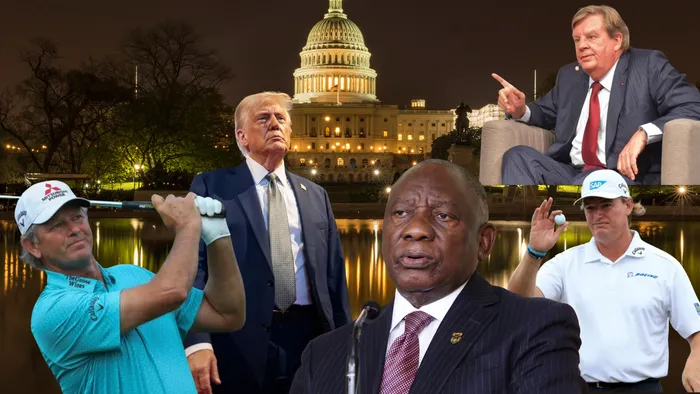
Elon Musk's Starlink faces BEE regulatory easing in South Africa after White House meeting
Image: IOL Graphics
JUST days after a high-stakes White House meeting reportedly attended by South African billionaire Johann Rupert and Tesla CEO Elon Musk, South Africa appears to be easing regulations for Musk’s Starlink satellite venture.
The move has iginited controversy over the growing influence of global business heavyweights on national policy, and whether behind-the-scenes lobbying is reshaping the country’s tech and telecommunications landscape.
The sudden policy shift has ignited controversy over the role of global business elites in shaping national policy raising fresh questions about political influence and backdoor diplomacy.
In a dramatic turn of events, less than two days after a tense White House meeting allegedly facilitated by South African billionaire Johann Rupert, Elon Musk’s Starlink satellite venture appears to be facing new regulatory easing in South Africa.
During a White House meeting that drew widespread attention, Rupert reportedly told officials to facilitate Musk’s entry into the South African market.
A meeting, which included President Cyril Ramaphosa and President Donald Trump, was marked by contentious exchanges. Trump, in particular, launched unfounded allegations of genocide against South Africa, a narrative critics say was influenced by Musk after the country refused to soften its Black Economic Empowerment (BEE) laws.
President Ramaphosa, under pressure to defend South Africa’s democratic values and policies, struggled to articulate the nation’s stance. Meanwhile, Rupert, citing concerns over crime and economic stagnation, urged that Starlink’s launch be prioritised.
“We need Starlink in South Africa,” Rupert declared, emphasising the importance of technological advancement for the country's future.
Regulatory Changes and Growing Tensions
While initially seeking an extension, it was reported on Friday that the government gazetted BEE amendments to ease licensing requirements for satellite service providers like Starlink.
In March, IOL published an investigation questioning whether Musk was leveraging BEE laws to destabilise South Africa’s economy through targeted sanctions and diplomatic pressure.
Political and Business Dynamics
Political analyst Joe Mhlanga commented on Musk’s influence: “He’s a businessman deeply involved in US politics. Musk’s relationship with Trump and his wealth gives him significant leverage. When South Africa refused to relax BEE laws, Musk appeared to use his political connections to push for favourable regulations.”
“Musk’s involvement extends beyond South Africa. The tech billionaire has shown a pattern of exerting influence, including donating millions to Trump’s campaigns and criticising South Africa’s expropriation and BEE policies as “openly racist.”
Industry Voices and the Call for Fairness
In March, South Africa’s telecom industry body, the Association for Communications and Technology (ACT), urged ICASA, the country’s telecom regulator, to approach the regulatory review fairly.
Phila Sithole, ACT’s head of industry research, emphasised the importance of a level playing field.
“We support the review, but it must be transparent and non-discriminatory,” Sithole said. “Regulations should benefit the entire sector, not just one company.”
“Our goal should be to attract investments that align with our development agenda. Large-scale projects like Starlink can be beneficial if managed strategically.”
The Rupert Family and South Africa’s Political Ties
Amid these developments, rumours have circulated suggesting Rupert may have played a behind-the-scenes role in facilitating Ramaphosa’s engagement with Trump.
Political analyst Professor Tumi Senokoena warned against oversimplifying such claims, emphasising the complex history between the Rupert family and the African National Congress (ANC).
“Cyril Ramaphosa’s ties to the Ruperts go back decades, through his roles in the labor movement and business interests.”
He stated that historically, Anton Rupert maintained a nuanced relationship with the ANC, leveraging his vast wealth to influence policy indirectly.
“This legacy has persisted in the activities of Johan Rupert, who remains one of Africa’s most influential investors through Richemont and other holdings.”
Global Influence and Future Directions
“Their investments are sensitive to international sanctions and economic policies. They benefit from stability but are also vulnerable to disruptions.”
Looking ahead, South Africa faces a delicate balancing act—navigating foreign influence, domestic policy, and economic growth. The recent moves around Starlink reflect broader geopolitical tensions, with implications for the country’s sovereignty and development trajectory.
While figures like Rupert and Musk wield substantial influence, their actions are rooted in a complex web of historical relationships and economic interests.
Professor Senokoena asserted, “Understanding these relationships helps us see that South Africa’s future appears to heavily depend on a few Afrikaner individuals who continue influencing the policy direction of this country.”
thabo.makwakwa@inl.co.za
IOL Politics
Related Topics:
